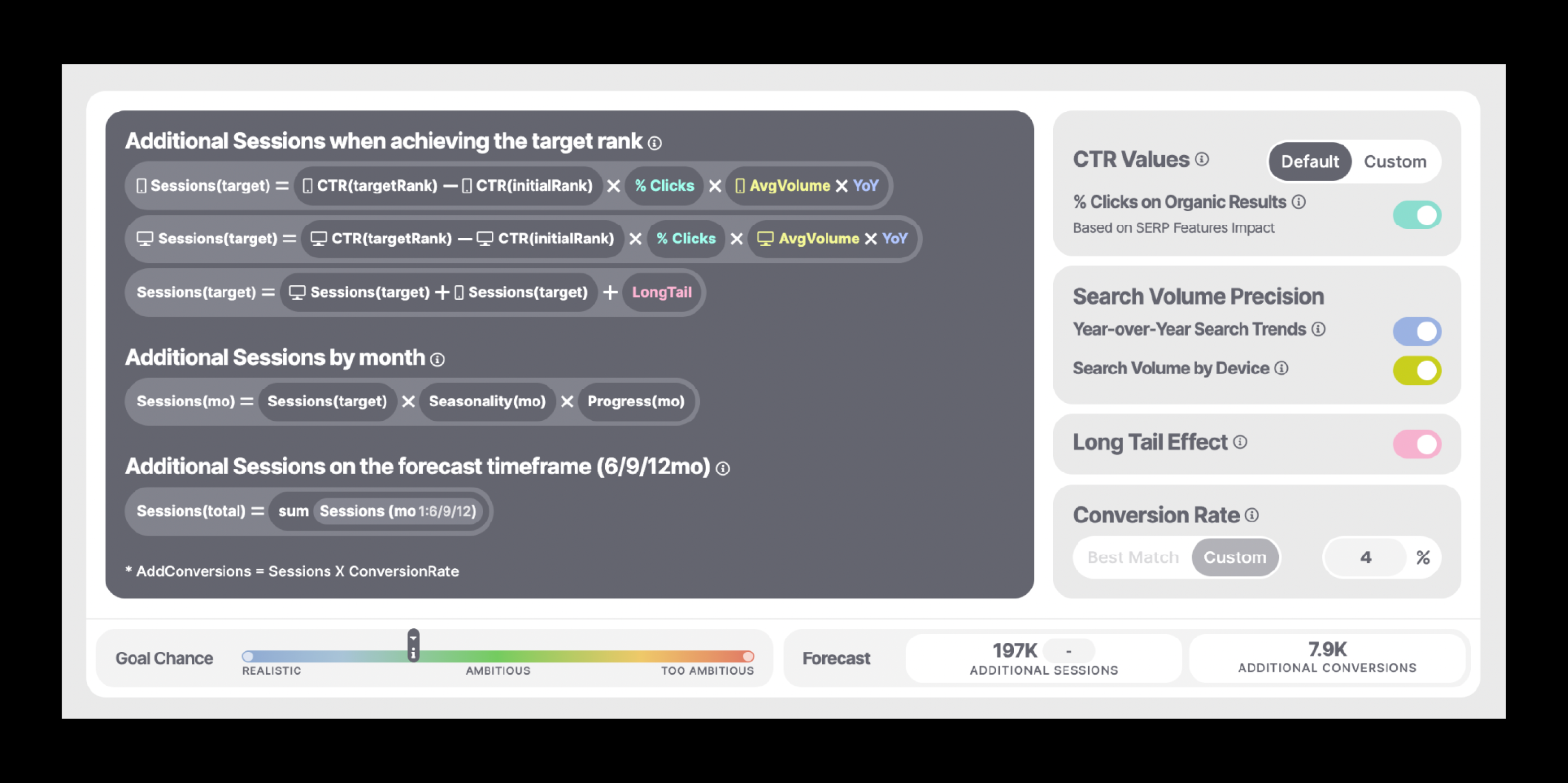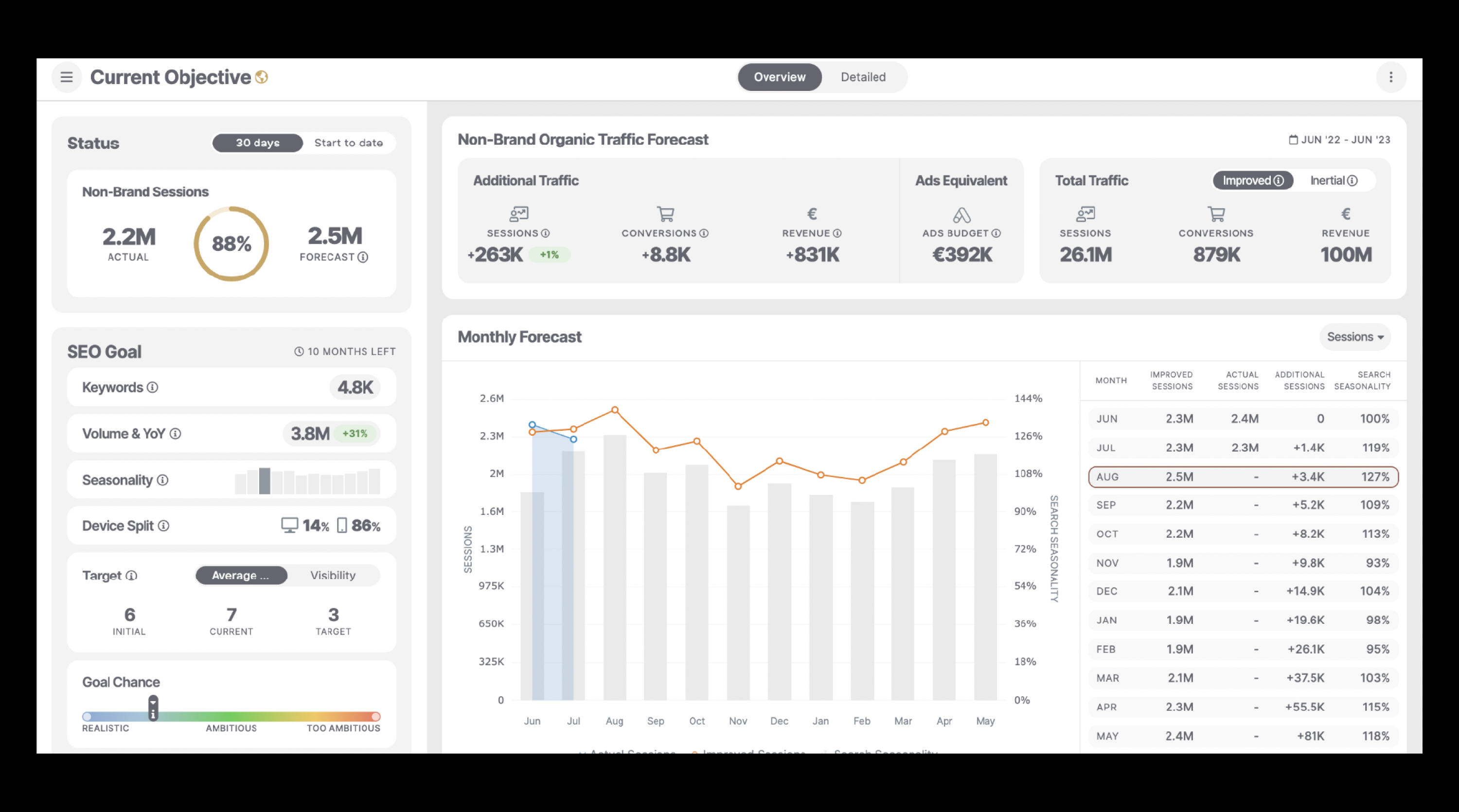That’s why, as Sandford advises, you need to proactively communicate both the opportunity and the downsides.
According to him, you should:
Flag the issue in good time.
Flagging a potential issue in a good time frame before it happens shows that you are on the ball. If you can see an issue somewhere down the line, it shows that you are thinking about long-term strategy, and that you are invested in your client’s success.Don’t try to hide things.
The fact that you are being upfront is valuable, and most clients will appreciate it. You don’t need to frame a potential downturn as a disaster. Rather, think about it as an important insight that can help your client to make informed decisions.Back up all communications with data.
When you are communicating what might sound like “bad news,” back it up with rigorous data to show the basis of your analysis. Whether it’s competitor analysis, keyword data, or broader market data, this additional insight will add a lot of extra value for clients.
Operate Holistically: Understand All Critical Influences On Your SEO Performance
As Reilly also highlights, SEO performance doesn’t happen in a silo; it’s key to translate that to your stakeholders:
SEO can often be treated as a channel separate from anything else, but in reality, it interacts with so many parts of a business. Working out what makes our clients tick (or struggle) might alter what we invest our efforts into.
Aaron Dicks, Performance Director at Impression, adds the importance of differentiation, especially when catering to enterprise clients:
At the enterprise level, it’s likely there will be a lot of crossover in opportunities presented by agencies, and all will be thorough in their auditing. It then becomes trickier to stand out amongst the crowd.
Future thinking and efficiency techniques (for example, AI integration) are one great way to add to differentiation.
This is where forecasting tools can also make a difference.
Action 2: Highlight SEO Opportunities With SEO Forecasting
SEO forecasting can help uncover unique opportunities and help you evaluate evolving trends before your competitors do.
Uncover Real-Time Market Shifts: Evaluate Shifting Trends
One way to uncover real market shifts and underlying opportunities is to gauge the search landscape, including year-over-year trends, to estimate growth potential.
Reilly argues:
Forecasting can be difficult when it comes to SEO but is also crucial to make sure you’re working towards a target that can provide a return on investment.
We look into the total search volume of the market that our clients are targeting, how much of a share they’re currently getting, and then consider what improvements are needed to get X traffic and Y sale increases.
This really helps bring the opportunity to life and makes [SEO] more tangible as an investment.
Complement this with a forecasting tool that takes into account all key variables influencing your SEO goals, and you’ll create a solid business case that sets you apart.
Because, just as James Euinton, Account Director at The SEO Works, points out, macroeconomic factors are “like the weather, we have little to no control over them but we will inevitably have to face them in business. Though that doesn’t mean we have to be unprepared.”
Euinton argues:
Search volumes are never set in stone and will often change depending on a multitude of factors which we are unable to control.
We need to demonstrate, instead, the factors that we do have influence over in our work and provide our estimations for how they can directly affect the site.
Using the data sets available in SEO, such as those available in Search Console’s performance section and Google Trends, can be a great form of understanding emerging keywords to capitalize on. We can also use these data sets to make estimations on how search volume will be affected going forward and use that to predict what the knock-on effect on traffic and consequent factors will be.
That’s why it’s critical to consider seasonality and year-over-year search trends when forecasting or reforecasting for SEO – you’ll spot hidden opportunities that your competitors will probably miss.
 Image by SEOmonitor, October 2022
Image by SEOmonitor, October 2022
In the end, Euinton explains it best:
Being responsive and having the ability to identify and capitalize on new opportunities quickly can really help to weather the storm of an uncertain business landscape.
Align: Map SEO To General Business Objectives
To prove SEO ROI and keep the cash flow in check, you need to show how your proposed campaign aligns with the general business objectives.
Here’s what Euinton advises:
In order to have a consistent cash flow, you need customers, and in order to have customers, you will likely require some form of marketing.
Marketing service costs are usually the first thing to be considered to be cut during difficult times. But slicing marketing budgets can be detrimental to cash flow later down the line, which in turn leaves less cash for the core operating costs of the business.
The advantage of SEO and similar digital marketing channels is that you have a wealth of data to show and demonstrate the effectiveness of your work.
It’s important that we are mindful of this by showing clients the value that we are providing to the site in a way in which they are able to understand and relay upwards.
Maintaining a good and consistent level of reporting and communication ensures that the client is fully able to understand the role that SEO not only has in terms of our KPIs, such as traffic and conversions, but where they fit into the general objectives of the business, too.
It’s also a question of reiterating the long-term gain of SEO. As a professional, you have the know-how and the responsibility to explain why continuing the investment in SEO makes sense.
Or, as Reilly explains:
Getting buy-in for the long-term benefits SEO can bring is integral. When faced with adversity, companies that are able to continue improving their website and market themselves effectively do tend to reap the rewards from it when out of the other side. Though, as we did during the height of the COVID-19 pandemic, giving some payment flexibility is also something we’re keen to do.
A forecasting exercise can be useful to achieve this, as well.
Once you explain how achieving desired ranking targets will bring additional sessions, conversions, and revenue, the mid- and long-term benefits become visible from a business perspective.
By comparing costs and results with their Google Ads spend equivalent, you get an external benchmark that makes your argument more compelling.
 Image by SEOmonitor, October 2022
Image by SEOmonitor, October 2022
Bonus Tip: Always Show How You’re Moving The Needle
This insight comes from The SEO Works, giving you even more arguments to be proactive in client communications and explain the real impact of your work:
Focusing on tasks that move the needle and prioritizing them is key in uncertain times.
There are so many improvements you can make for a website in SEO that it’s difficult to isolate the tasks that are really going to be impactful in terms of obtaining rankings, traffic, and conversions. Add the complexity of different website types (such as ecommerce, brochure, single page apps), CMS platforms and business areas, and this becomes even more unclear.
When we audit a site or draw up tasks for the upcoming quarter, prioritizing impactful work should be the cornerstone.
In addition to assessing the site thoroughly to get a full picture of where a site is at, it’s important to take stock of what issues are raised and consider what the resource cost for both ourselves and the client will be when advising what to tackle.
SEO projects are always going to be undertaken within the confines of a budget, and it’s essential to be able to adhere to this by working as efficiently as possible and prioritizing the correct tasks.
For example, it’s pointless to commit several developer tickets and campaign hours to work on improving a Core Web Vitals score by a few points if the content is unable to be crawled and assessed by Google in the first place.
In addition to the actual tasks, observing our workflow and using tools to minimize repetitive manual work, such as using scripts to automatically test redirects and status codes can be hugely beneficial to project efficiency.
In A Nutshell
Every conversation with stakeholders and clients is an opportunity to be proactive and tackle all uncertainties involving digital marketing budgets, SEO, and business objectives.
Being transparent, sharing potential issues and caveats as the market trends shift, and constantly connecting your SEO work with business KPIs are crucial to keeping churn low.
As you’ve seen from top digital marketing agencies and their advice, showing that you’re a business partner and care for the long-term experience becomes a winning strategy.
That’s why, at SEOmonitor, we’ve developed a forecasting solution that’s fully integrated with our daily ranking data, search data (search volumes, seasonality, and year-over-year trends), and has a transparent algorithm – so you know what makes your business case trustworthy and you can explain it, especially when everything feels uncertain.
Join us if you want to create trust and prove the business value of your SEO work.
